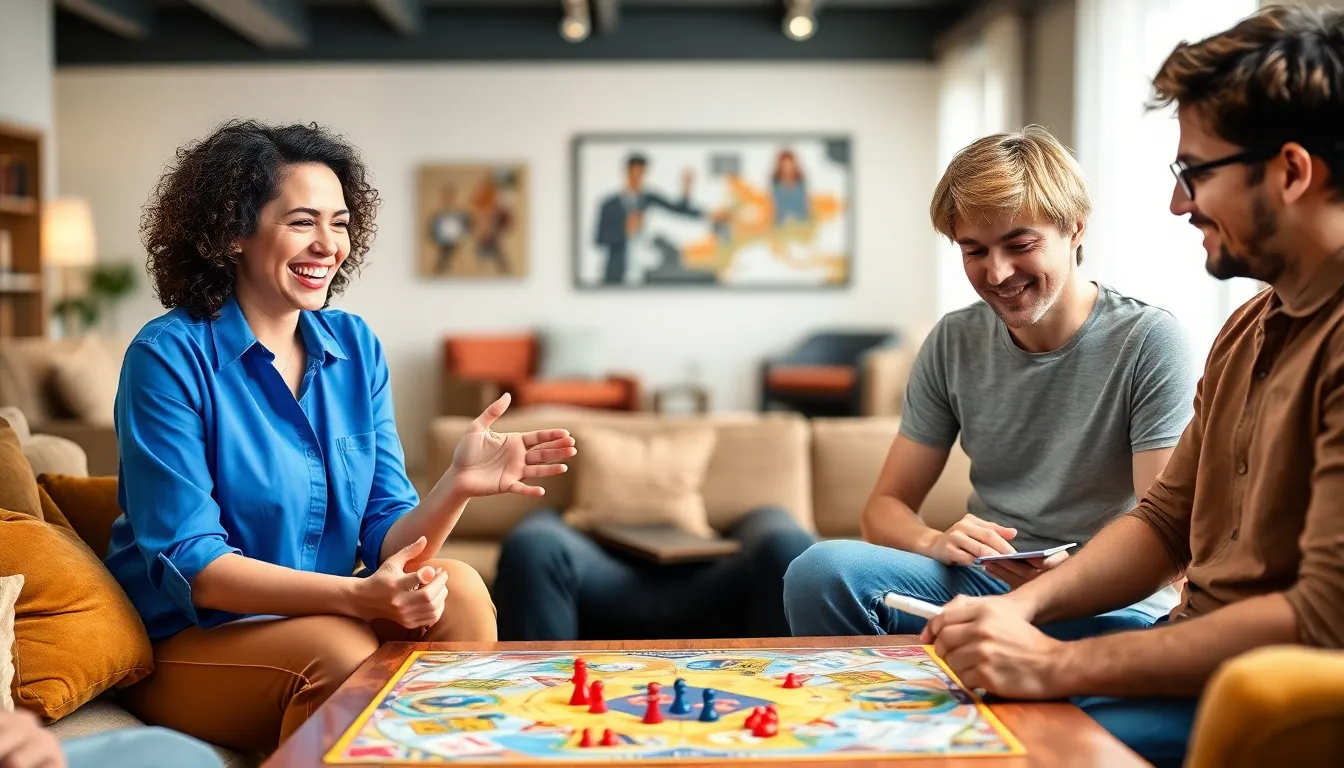In a world where disagreements can escalate faster than a cat meme goes viral, conflict resolution games offer a refreshing way to turn tension into teamwork. These engaging activities not only lighten the mood but also equip players with the skills they need to navigate tricky situations. Who knew that resolving conflicts could be as fun as a game night with friends?
Conflict Resolution Games
Conflict resolution games serve as innovative tools that transform tension into teamwork. Engaging in these activities fosters essential skills for handling challenging situations while making the process enjoyable.
Definition and Purpose
Conflict resolution games incorporate structured activities designed to mitigate disagreements and foster collaboration. Players engage in simulations that mirror real-life scenarios, encouraging open communication and empathy. These games aim not just to resolve conflicts but also to build connections among participants. By fostering creativity and critical thinking, players learn strategies for navigating disputes effectively. Overall, these games promote an understanding of differing perspectives, aiding personal and collective growth.
Importance in Various Settings
Employing conflict resolution games proves beneficial across diverse environments. In educational settings, these activities enhance students’ interpersonal skills, preparing them for future challenges. Organizations utilize these games to improve team dynamics and create a collaborative culture, leading to increased productivity. Community programs engage participants in resolving local conflicts, strengthening social ties and fostering harmony. Families can also benefit from these games by enhancing communication skills and building trust, ultimately improving relationships at home.
Types of Conflict Resolution Games

Conflict resolution games come in various forms, each designed to engage participants differently. Players can choose between cooperative games that emphasize teamwork or competitive games that introduce challenge and strategy.
Cooperative Games
Cooperative games encourage players to work together towards a common goal. Players often face challenges that require open communication and collaboration. Roles may shift, promoting trust and empathy among participants. Examples include team-building exercises where members solve puzzles or navigate obstacle courses. Initiatives like these enhance interpersonal skills while fostering a sense of community. Group dynamics improve as individuals learn to appreciate differing perspectives. Such experiences reinforce the importance of empathy and effective communication in resolving conflicts.
Competitive Games
Competitive games introduce a friendly rivalry that can sharpen conflict resolution skills. Teams often strategize to outsmart opponents while managing disagreements constructively. Participants gain valuable insights into negotiation and compromise during these engagements. Examples include debate tournaments or role-playing scenarios where conflicting viewpoints arise. These activities challenge players to articulate their positions and consider opposing arguments. A healthy competitive spirit arises, promoting resilience and adaptability. This environment empowers individuals to embrace conflict as an opportunity for personal growth and understanding.
Benefits of Conflict Resolution Games
Conflict resolution games offer numerous advantages in personal and professional environments. Engaging in these activities allows individuals to develop critical skills necessary for effectively handling disagreements.
Skill Development
Players enhance various skills through conflict resolution games. Negotiation abilities improve as participants articulate their positions and seek common ground. Problem-solving skills increase when faced with real-life scenarios, pushing players to think creatively. Emotional intelligence thrives, fostering better understanding and management of feelings during conflicts. Additionally, participants gain resilience, learning to adapt to challenges in different situations. All these skills contribute to greater personal growth and improved relationships.
Enhanced Communication
Communication benefits significantly from conflict resolution games. Players practice expressing thoughts clearly and listening actively to others. The games promote open dialogue, ensuring everyone feels heard and valued. Understanding diverse perspectives becomes easier, which helps to cultivate empathy. Participants also learn to navigate difficult conversations, building confidence in their communication skills. This enhanced ability to engage with others translates into stronger connections in both personal and professional settings.
How to Implement Conflict Resolution Games
Implementing conflict resolution games requires clear strategies and planning. Selecting the appropriate game for your group or setting can greatly influence the outcome.
Choosing the Right Game
Consider the group’s dynamics when choosing a game. Analyze the objectives of the session; whether fostering teamwork or enhancing negotiation skills influences the selection. Research various game types, such as cooperative or competitive formats. Ensure that the chosen activity aligns with the participants’ age and skill levels. Evaluate previous experiences; what worked or didn’t in past sessions can guide future choices. Utilize online resources to find ideas and feedback on different games. Prioritize inclusivity to ensure every participant can engage meaningfully.
Setting Up the Environment
Establishing the right environment is crucial for success. Create a welcoming space that encourages open communication and collaboration. Arrange seating in a circle to foster equality and promote interaction. Limit distractions by choosing a quiet area free of interruptions. Prepare necessary materials in advance, ensuring all participants have access to what they need. Allocate sufficient time for the activity; rushing can diminish its effectiveness. Set clear ground rules about respect and listening before starting. Encourage participants to express themselves freely, reinforcing that the space is safe for sharing thoughts.
Conclusion
Conflict resolution games offer a unique approach to transforming disagreements into opportunities for growth. By engaging participants in structured activities, these games foster essential skills like communication and empathy. Whether in educational settings, workplaces, or family environments, they create a space for collaboration and understanding.
The balance between cooperative and competitive elements ensures that players can develop their conflict resolution abilities in a fun and interactive way. As individuals practice negotiation and problem-solving, they build stronger relationships and enhance their emotional intelligence.
Ultimately, integrating conflict resolution games into various contexts can lead to more harmonious interactions and a deeper understanding of one another. Embracing these activities can pave the way for personal and collective development, making conflict resolution not just a necessity but an enjoyable experience.




